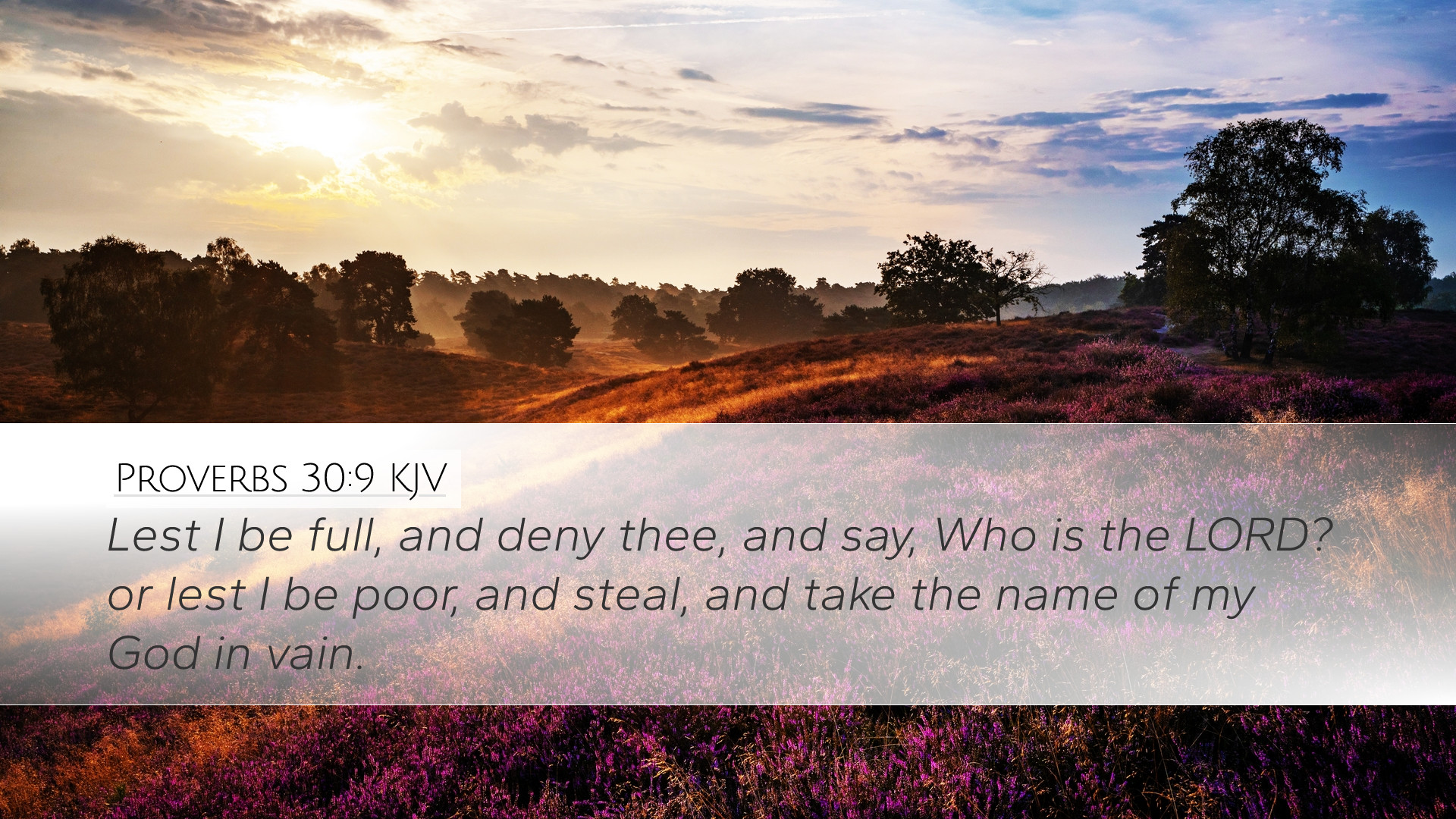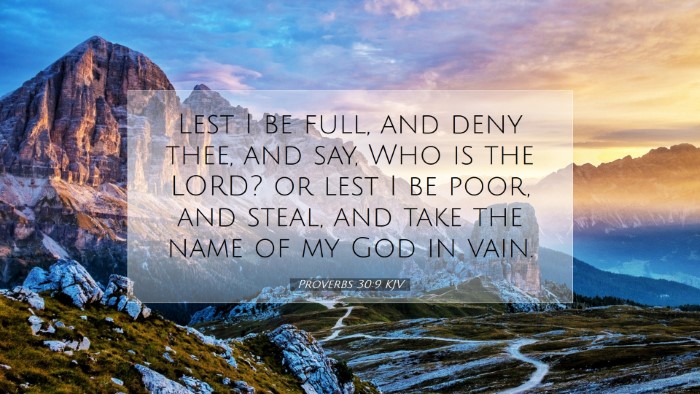Commentary on Proverbs 30:9
Verse Text: "Lest I be full, and deny thee, and say, Who is the Lord? or lest I be poor, and steal, and take the name of my God in vain."
Contextual Overview
The verse is part of the sayings of Agur, a figure in Proverbs whose identity is largely unknown. This chapter (Proverbs 30) addresses the wisdom of understanding the balance between wealth and poverty and the spiritual implications that attend both conditions.
Commentary Insights
General Interpretation
This verse presents a poignant reflection on the dangers of both abundance and scarcity. It captures the moral and spiritual challenges that can arise in the midst of varied life circumstances. It encourages a mindset that seeks moderation and a dependency on God, illustrating that the richness of life does not solely come from material possessions.
Matthew Henry's Commentary
Henry emphasizes two central dangers that the author of the proverb wishes to avoid:
- Lack of Dependence on God: When one is filled with riches, there is a tendency to forget God, leading to a state of spiritual apathy. This circumstance invites arrogance, where one's self-sufficiency replaces reliance on the Divine.
- Desperation Leading to Sin: Conversely, poverty can lead to a painful state of desperation that tempts one toward theft or dishonesty. Here, taking God’s name in vain might refer to invoking God's presence or blessing while engaging in unrighteous acts.
Henry articulates that both extremes necessitate a life lived in the fear of God, where one acknowledges Him as the source of all that is good.
Albert Barnes' Commentary
Barnes expands upon the implications of the verse with a focus on the spiritual and practical ramifications of both wealth and poverty:
- The Dangers of Wealth: He notes that abundance can result in a lack of appreciation for God's blessings and an inclination to attribute one's successes to personal effort rather than divine providence.
- The Pitfalls of Poverty: Barnes warns that a state of need might result in a compromise of integrity, where one might exploit God’s name to justify immoral actions. This creates a cycle of spiritual disillusionment and moral failure.
He advocates for a life anchored in humility and dependence on God’s provision, emphasizing that true sustenance comes from a relationship with the Lord, not just material wealth.
Adam Clarke's Commentary
Clarke provides a linguistic and cultural analysis of the terms used in the verse:
- The Term 'Full': Clarke notes that being full can refer to being content and complacent to the point of forgetfulness regarding God's crucial role in life.
- Understanding 'Poor': He elaborates that poverty should not lead to a lapse in moral standards, and he interprets stealing as a loss of trust in God’s provision and goodness.
Clarke stresses the importance of seeking a balanced life, avoiding both extremes. He also highlights the necessity of invoking God's name with reverence and sincerity, as taking it in vain is indicative of a deeper spiritual crisis.
Theological Implications
This verse invites deep theological reflection on human nature and our relationship with God. The balance between earthly riches and spiritual integrity serves as a reminder of our dependency on divine grace. Further, it challenges believers to evaluate their motivations in both wealth and poverty, questioning how these states affect their faith and relationship with God.
Moral and Ethical Considerations
Both extremes—wealth and poverty—impose ethical dilemmas on believers:
- The wealthy are called to a heightened sense of responsibility to share their blessings and to remain humble.
- The impoverished are encouraged to uphold their integrity and seek justice without resorting to dishonesty.
Practical Application
In practical terms, this proverb serves as a guide for believers to continually evaluate their faith, asking:
- How do my material conditions affect my walk with God?
- Am I tempted to forget God when things are going well?
- In times of need, do I still trust in God's provision without compromising my values?
Ultimately, Proverbs 30:9 urges all to foster a life that honors God, recognizing Him both in abundance and in need. Such an approach cultivates a deeper relationship with the Lord, reaffirming that genuine riches lie in spiritual fulfillment rather than material gain.
Conclusion
In summary, Proverbs 30:9 holds profound wisdom for all—pastors, students, and theologians alike. The balance between wealth and poverty, accompanied by a respectful relationship with God, serves not only as a caution but as a call to live a life reflecting divine wisdom.


